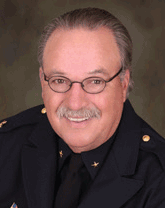
Over the coming year, the IACP will be moving forward in a number of areas: new methods of
- outreach,
- membership communication,
- policy responses, and
- membership recruitment that will strengthen our organization and allow us to better serve our members.
One such progression will be conducting a comprehensive review of the IACP Constitution and Rules in order to ensure that the document’s contents reflect the modern realities we face.
It has been 12 years since we have conducted a comprehensive review of the association’s constitution, and, so, the time has come to go through this process again. In order to reinvent ourselves and become a more open organization, we need to ensure that our Constitution and Rules supports a lean and responsive organization. To implement this change, I have appointed our new parliamentarian, Police Chief Ellen Hanson, Lenexa, Kansas, to lead a full review.
Along with Chief Hanson, the IACP Constitution and Rules Committee will also aid in this task. Members include
- Third Vice President Ron Serpas, chief, New Orleans, Louisiana
- International Vice President Nelson Garcia, colonel, Military Police of the Federal District, Brasilia, Brazil
- Past President Chair Russ Laine, chief, Algonquin, Illinois
- Vice President/Treasurer Dwight Henniger, chief, Vail, Colorado
- Chief Richard Melton, Napa, California
- Chief Judy Bradshaw, Des Moines, Iowa
- Chief Randy Lane, Union Pacific Railroad, Irving, Texas
Additionally, Executive Director Leslie McGill of the California Police Chiefs Association and Executive Director James McLaughlin of the Texas Police Chiefs Association will serve as special advisors to the IACP Constitution and Rules Committee. Finally, IACP Executive Director Bart R. Johnson and other staff will participate in the committee and provide the integral link between the IACP staff and the Executive Committee with the unique perspective of managing the day-to-day operations of the association.
These individuals have been selected for this committee because of their long association with the IACP, their exposure to its operating principles, and their dedication to ensuring the association’s future success. The committee is a strong team, and, with our combined efforts over the next several months, this project will provide a solid and dependable review of the IACP and its priorities.
The charge of this committee is two-fold:
- A review of the constitution and recommendations for any changes to be brought forward to our members next year at IACP 2013 in Philadelphia, Pennsylvania, for a vote; and
- a full review of our rules.
Substantive and nonsubstantive changes will be considered. Reviewing all items will help to guarantee that sound, contemporary, meaningful operations are at work, without impediments, in support of our association’s expanding goals. The Constitution and Rules must support our efforts to streamline the IACP and usher in contemporary, 21st century policing. This is another way we can reach our goal of serving the leaders of today and developing the leaders of tomorrow.
To be responsive to the needs of our membership, we must remove any bureaucratic processes and rules that inhibit our ability to meet our objectives. At the same time, we need to keep in place safeguards that are afforded by a modern constitution and set of rules. This is why I have asked Chief Hanson to lead this effort with the committee members who all have demonstrated an understanding of policing and the issues confronting police associations of the 21st century.
It is critical that the general membership also play a role in this vital review process. As the preamble to the IACP Constitution makes clear, the ultimate authority in the IACP is its membership. As the review process continues, the views and suggestions of the membership are important. I strongly urge you to participate in the review and revision of the association’s governing document.
To help you in this regard, the IACP Constitution may be accessed through the IACP’s website at http://www.theiacp.org. We have also designated an email address where you may send IACP your suggestions and comments. It is constitution@theiacp.org.
I am confident that we will succeed, and I look forward to bringing proposed changes before the membership at IACP 2013 in Philadelphia, Pennsylvania. I truly believe that this is the next step in making significant progress towards our goals of streamlining our operations, increasing our efficiency, developing new private sector partnerships, growing our membership, and making good on our promise to provide our members with the information they need to serve the communities they are sworn to protect.♦
Please cite as:
Craig T. Steckler, “IACP Constitutional Review,” President’s Message, The Police Chief 79 (December 2012): 6–7.


